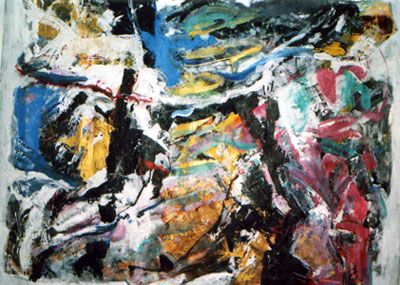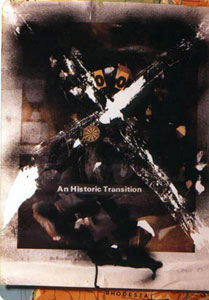VISIBLE MINORITIES IN QUEBEC'S CULTURAL INSTITUTIONS: IS THE FUTURE ALL WHITE?
Julian Samuel
My experimental documentaries show how the West has observed, configured, and hammered the Third World. They have been shown in Canada, the USA, the UK, and most recently, Vienna. The National Gallery of Canada has acquired and exhibited this work which, in respect to the still-resolving Israeli-Palestinian conflict, emphasizes the importance of adopting a multiple perspectives view of history, and reporting of current events. My work was categorically rejected in Quebec.
Based on personal experience, I believe that, among other cultural institutions, the Musée d'Art Contemporain de Montréal, and The Montreal Museum of Fine Arts are resolutely closed to les autres. These institutions purchase and exhibit the work of mainly white artists.
Marcel Brisebois, the director of the Musée d'Art Contemporain de Montréal, dismissed four years of my work in one paragraph. He was able to give me the names of his acquisitions committee members, but not details about their qualifications. According to Brisebois, they have international reputations.
Stéphane Aquin, a curator at The Montreal Museum of Fine Arts, rejected my recent work (abstract paintings). Aquin admitted the museum's acquisition committee is all-white. He refused to send me a list of his own curatorial efforts and publications, and, predictably, refused to give me the names of his acquisitions committee members nor tell me anything of their qualifications. Should this publicly funded cultural institution not be required to make public the committee's qualifications on request? Two curators at The National Gallery of Canada E-mailed me their complete qualifications when asked.

IS THE FUTURE ALL WHITE?
There is not a single visible minority in a key position anywhere in Quebec's cultural institutions. The architecturally juvenile Ex-Centris and the Conseil des Arts et des Lettres du Québec (CALQ) are ninety-nine-point-nine per cent all-white up at the top. Programming at the cinémathèque Québécoise is done entirely by the following white men: Robert Daudelin, Marco de Blois, Dominique Dugas, Alain Gauthier, Pierre Jutras and Pierre Véronneau. This institution has shown my work, but only during the graveyard summer months.
The domination of our cultural institutions by the Brisebois, the Aquins, the Daudelins has, in my opinion, prevented competent visible minorities from getting into key positions. Are these elites belligerently insensitive to the contributions of les autres? Are they only able to take seriously the works of people such as Paul-Emile Borduas, Jean-Paul Mousseau, Roland Poulin, Jocelyne Alloucherie, Robert Lepage, and Francois Girard? Of course, a few token minorities are marginally appreciated. Dany Laferrière comes to mind. He wrote a poem for the Société Saint Jean-Baptiste.
Would provincially influential figures such as Lise Bissonnette, Jacques Godbout, Pierre Falardeau, Chantal Pontbriand, Richard Martineau ever encourage the emergence of internationally influential, foreign born intellectuals such American-Palestinian Edward Said or French-Lebanese Maalouf? Although, a few non-Francophone writers and artists such as Mordecai Richler and Leonard Cohen have emerged in Quebec, generally speaking the 'foreign' intellectual who speaks other languages, or who is critical of separatism is silenced.
How many black French-Canadian actors can you name? Can you name a major Quebec film director who is of Asian origin? In 1999 why does Le Devoir not have any blacks in key positions? Can it be that out of 80,000 Canadians of Haitian origin there is not one qualified journalist who merits a key job at this (The Hour) newspaper?

HOW CAN VISIBLE MINORITIES GET INTO QUEBEC'S CULTURAL INSTITUTIONS?
Ideally, democratic states should not interfere with the arts whatsoever; they should reinvest what they gouge from tax payers into arts without censorial interruption. However, when Quebec arts and cultural institutions ruin democratic values by hiring whites only and by using foggy acquisitions procedures, does it not become necessary to use legislation to junk the old white boy's system? About 15 years ago many of us criticized The Canada Council for excluding visible minorities. The Council efficiently responded to the criticism by opening up to competent minorities. Could this ever happen at Conseil des Arts et des Lettres du Québec (CALQ)? I predict that in the year 2000 CALQ will not hire a single minority for a key post. When will Quebec catch up with the rest of Canada? Does being a 'distinct society' mean keeping visible minorities out of key positions?
For how much longer will these cultural elites keep minority artists, curators and intellectuals outside the city walls? Will we have to go on paying for the supposed humiliations of the past or is this simply an excuse? Are progressive, white francophones ever going to speak out against this fossilized group? Minorities in Quebec should organize to remove this ugly, small town chauvinism.
THE END